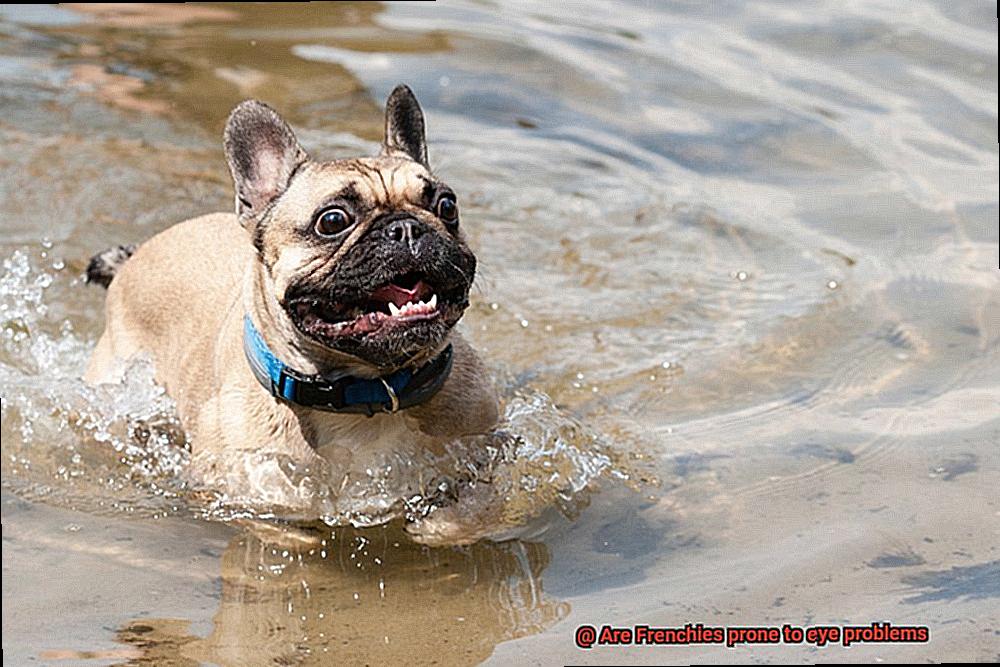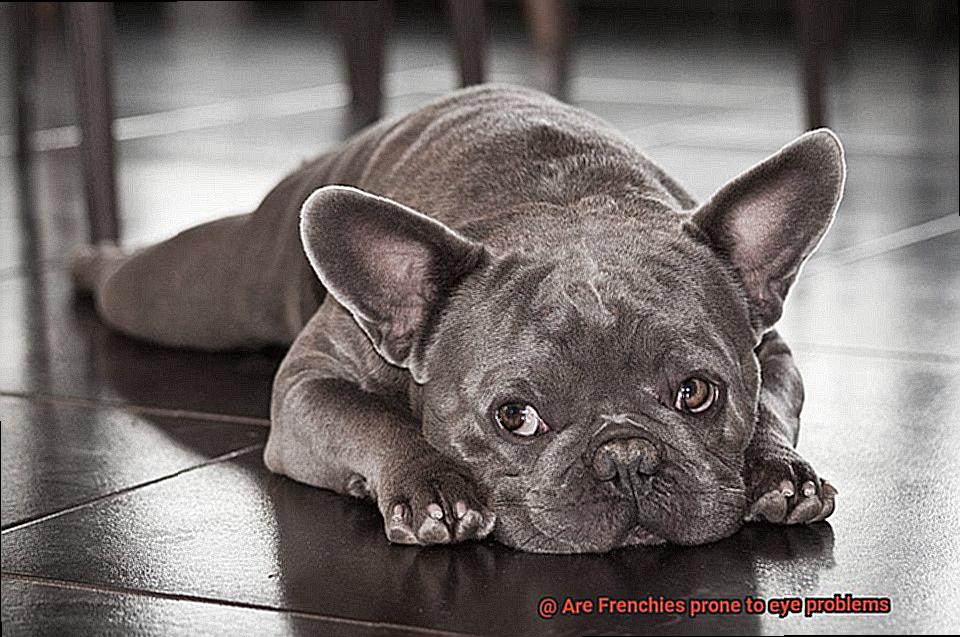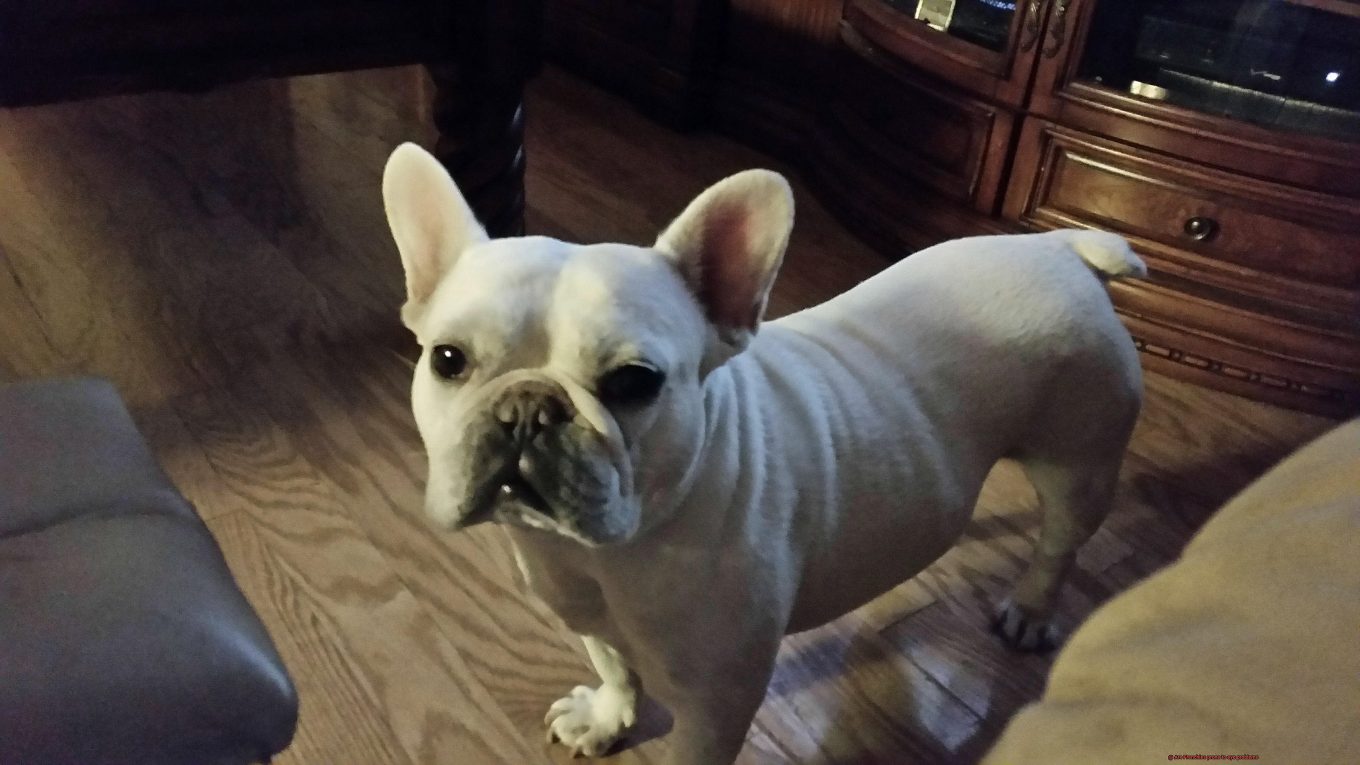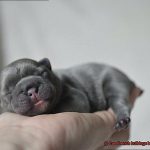Are Frenchies prone to eye problems?
Get ready for an extraordinary adventure into the captivating universe of French Bulldogs. These pint-sized pups have stolen hearts worldwide with their unique looks and irresistible charm. But amidst all the adoration, it’s crucial to understand that like any other breed, Frenchies have their fair share of health concerns. Today, we’re diving deep into their prone eye problems and how we can give them the extra care they need.
French Bulldogs, with their affectionate nature and those adorable bat-like ears, effortlessly melt our hearts. Yet beneath their enchanting facade lies a set of characteristics that make them more susceptible to ocular issues than other breeds. By understanding these potential eye problems, we can equip ourselves with the knowledge necessary to provide top-notch care for our furry friends.
Research conducted by veterinary experts has illuminated the primary factors contributing to Frenchies’ increased likelihood of eye problems. One critical factor is their unique facial structure – a short, pushed-in muzzle paired with prominent, expressive eyes. While these features are undeniably endearing, they unfortunately create a perfect storm for ocular troubles.
The combination of a short muzzle and bulging globular eyes gives rise to what’s known as brachycephalic syndrome in French Bulldogs. This condition puts them at higher risk for various eye conditions. The relatively shallow eye sockets in these little cuties make them more vulnerable to injuries and trauma such as proptosis (eye displacement) and corneal ulcers. Additionally, those prominent peepers often face exposure to environmental irritants like dust, smoke, and pollen – leading to inflammation and discomfort.
But wait. There’s more. The charming wrinkles that adorn French Bulldogs also come at a cost. While these folds add an extra dose of cuteness, they can trap moisture, debris, and bacteria. This unfortunate combination can cause skin infections that result in irritation and swelling around the eyes – a condition known as dermatitis. If left untreated, these infections can significantly impact their overall ocular health.
Now, let’s not get carried away. It’s important to note that not every French Bulldog will experience eye problems. However, their predisposition calls for a watchful eye and proactive measures to promote good ocular health. Regular vet check-ups, proper grooming techniques, and maintaining a clean and irritant-free environment are essential steps in minimizing risks
Common Eye Problems in French Bulldogs
Contents
- 1 Common Eye Problems in French Bulldogs
- 2 Cherry Eye in French Bulldogs
- 3 Entropion in French Bulldogs
- 4 Keratoconjunctivitis Sicca (KCS) in French Bulldogs
- 5 Inherited Eye Diseases in French Bulldogs
- 6 Progressive Retinal Atrophy (PRA)
- 7 Cataracts
- 8 Prevention and Management of Eye Problems
- 9 Conclusion
French Bulldogs are beloved for their playful personalities and distinctive appearance. However, like any breed, they are susceptible to certain health issues, including eye problems. In this article, we will explore the common eye problems that French Bulldogs may encounter and provide tips on how to prevent and manage them.
Cherry Eye:
One common eye problem in French Bulldogs is cherry eye, where the gland of the third eyelid becomes prolapsed, appearing as a red mass in the corner of the eye. To prevent cherry eye, avoid excessive rubbing or scratching of the eyes and be mindful of their surroundings to prevent trauma to the delicate eye area. If your Frenchie develops cherry eye, consult your veterinarian for surgical options.
Corneal Ulcers:
Corneal ulcers are open sores on the cornea caused by trauma or underlying eye conditions. To prevent corneal ulcers, shield your French Bulldog from potential eye irritants like dust, dirt, or chemicals. Regularly cleanse their face and eyes with a gentle cleanser designed for canines. If you notice signs of corneal ulcers, such as excessive tearing or squinting, seek veterinary attention promptly.
Dry Eye:
Dry eye, also known as keratoconjunctivitis sicca, occurs when there is reduced tear production. To prevent dry eye in your French Bulldog, ensure they stay hydrated and avoid dry or dusty environments. Regularly administer artificial tears or prescribed medication as recommended by your veterinarian to keep their eyes lubricated.
Entropion:

Entropion is a condition where the eyelid rolls inward, causing the eyelashes to rub against the cornea. To prevent entropion, avoid breeding French Bulldogs with this inherited condition and consult with a veterinarian before breeding your Frenchie. If your dog is diagnosed with entropion, surgical correction may be necessary.
General Eye Irritations and Infections:
Because of their prominent eyes and facial folds, French Bulldogs are more prone to eye irritations and infections. To prevent these issues, regularly clean their face and eyes with a gentle, canine-specific cleanser. Be cautious when using any products near their eyes and avoid potential irritants. If you notice signs of eye irritation or infection, consult your veterinarian for appropriate treatment options.
Cherry Eye in French Bulldogs
French Bulldogs are undeniably adorable little bundles of joy, but like any breed, they can be prone to certain health issues. One common problem that French Bulldog owners may encounter is cherry eye. This eye condition can be a cause for concern, but with the right knowledge and prompt veterinary attention, it can be effectively managed.
So, what exactly is cherry eye? Well, it’s not as appetizing as it sounds. Cherry eye is characterized by the prolapse of the third eyelid gland, which causes a red or pink bulge to appear in the corner of your Frenchie’s eye. This happens when the connective tissue that holds the gland in place is weak, allowing it to pop out and become visible.
Cherry eye can occur in French Bulldogs of any age, but it is most commonly seen in puppies or dogs under two years old. If you notice a bulge in the corner of your Frenchie’s eye, along with redness, excessive tearing, or squinting, it’s time to schedule a visit to the vet.
When it comes to treating cherry eye in French Bulldogs, there are both medical and surgical options available. In mild cases, your veterinarian may attempt a technique called manual reduction. This involves gently pushing the prolapsed gland back into its normal position. While this can be successful in some cases, it’s important to note that cherry eye may recur even after manual reduction.
For more severe or recurrent cases of cherry eye, surgical intervention may be necessary. The most common surgical procedure used to treat cherry eye is the “tacking” or “pocket” procedure. During this surgery, the gland is repositioned and sutured into place to prevent future prolapse. While surgery has a high success rate, there is a small risk of complications such as infection or scarring.
As a French Bulldog owner, it’s important to be proactive in preventing eye problems. Here are some preventive measures you can take:
- Avoiding trauma to the eyes: Rough play or exposure to irritants can increase the risk of cherry eye and other eye conditions. Keep an eye on your Frenchie during playtime and try to minimize potential hazards.
- Regularly cleanse your Frenchie’s face: Pay special attention to cleaning the area around their eyes. This helps remove debris and reduces the likelihood of eye infections.
- Maintain regular veterinary check-ups: Regular visits to the vet can help identify any potential eye problems early on and ensure prompt treatment if needed.

Entropion in French Bulldogs
French Bulldogs, with their adorable and distinctive facial structure, can be prone to certain health issues, including entropion. Entropion is a condition where the eyelid rolls inward, causing the eyelashes or hair on the eyelid to rub against the eye’s surface. This constant rubbing can lead to discomfort, inflammation, and potential damage to the eye.
The unique facial features of French Bulldogs contribute to their susceptibility to entropion. The breed’s short snout and prominent eyes can increase the likelihood of the eyelids rolling inward. Additionally, their loose facial skin and wrinkles can exacerbate the condition. It is essential for French Bulldog owners to be aware of this potential issue and remain vigilant for symptoms.
Symptoms of entropion in French Bulldogs may include excessive blinking, squinting, tearing, redness, and discharge from the eyes. If you observe your furry friend pawing at their eyes or rubbing their face against surfaces, they may be experiencing discomfort or pain due to entropion.
If left untreated, entropion can lead to more severe complications such as corneal ulcers, infections, and even vision loss. Therefore, it is crucial to seek veterinary attention if you suspect your French Bulldog may be affected.
Fortunately, treatment options for entropion in French Bulldogs are available. Surgical correction is often recommended to reposition the eyelid so that it no longer rolls inward. The specific technique used will depend on the severity of the condition and your dog’s individual needs.
Proper post-surgery care is vital for a successful recovery. It is important to follow your veterinarian’s instructions regarding medication administration, wound care, and activity restrictions. Regular follow-up visits are also necessary to monitor healing progress and ensure no complications arise.
Prevention is always better than cure when it comes to entropion in French Bulldogs. Responsible breeding practices play a crucial role in reducing the incidence of this condition. Breeders should prioritize selecting breeding pairs with no history of entropion or other eye problems. Regular eye examinations by a veterinary ophthalmologist can also help identify early signs of entropion or other eye conditions, allowing for prompt intervention.
Keratoconjunctivitis Sicca (KCS) in French Bulldogs
Keratoconjunctivitis Sicca (KCS), also known as dry eye, is a common eye condition that affects French Bulldogs. This condition occurs when the tear glands in the eyes do not produce enough tears to keep the eyes adequately lubricated. As a result, the eyes become dry and inflamed, leading to discomfort and potential damage to the cornea.
French Bulldogs are particularly prone to developing KCS due to their unique facial structure. Their adorable squished faces and big, bulging eyes that we love so much can actually work against them when it comes to tear production and drainage. Their tear glands simply can’t keep up with the demands of their precious peepers, resulting in dryness and inflammation.
So, how can you tell if your French Bulldog has KCS? Look out for symptoms such as redness, irritation, excessive blinking, squinting, and a thick, yellowish discharge from the eyes. These signs are not only unsightly but can also lead to more serious complications if left untreated, such as corneal ulcers, scarring, and vision loss.
The good news is that there are ways to help our furry friends find relief from their dry eyes. One option is using artificial tears or lubricating ointments specifically made for dogs. These products can supplement their natural tear production and provide much-needed moisture. Just make sure they’re preservative-free to avoid any further irritation.
In more severe cases of KCS, veterinarians may prescribe medications that stimulate tear production and reduce inflammation. Think of them as a superhero team coming to the rescue of your Frenchie’s eyes.
Prevention is always better than cure. While Frenchies are genetically predisposed to KCS, there are steps we can take to minimize the risk. A well-balanced diet with omega-3 fatty acids can promote tear production, and avoiding dry and dusty environments can prevent eye irritation.
Regular visits to the vet are crucial for early detection and management of KCS. Your vet can perform tests to measure tear production and evaluate the health of your Frenchie’s eyes. And don’t forget about daily eye care. Cleaning their eyes and keeping those adorable facial folds dry can go a long way in preventing infections.
Inherited Eye Diseases in French Bulldogs
French Bulldogs, with their squished faces and big bug eyes, are undeniably adorable. But behind their charming appearance lies a vulnerability to inherited eye diseases. These conditions, passed down through genetic inheritance, can affect the vision and overall well-being of these beloved pets. As a responsible owner, it is crucial to be aware of these diseases and take the necessary steps to protect your furry friend.
One common inherited eye disease in French Bulldogs is cherry eye. This condition occurs when the gland in the third eyelid becomes prolapsed, forming a red mass in the corner of the eye. It can be uncomfortable for your pup and may require surgical intervention to correct.
Another condition to watch out for is juvenile cataracts. Just like in humans, cataracts cause the lens of the eye to become cloudy, leading to vision impairment or even blindness if left untreated. Juvenile cataracts typically develop in puppies between six months to two years old.
Progressive retinal atrophy (PRA) is another inherited eye disease that affects French Bulldogs. This degenerative condition causes the cells in the retina to deteriorate over time, resulting in progressive vision loss and eventual blindness. It often starts with night blindness and worsens gradually.
In addition, French Bulldogs are prone to corneal ulcers. Their prominent eyes and shallow eye sockets make them more susceptible to these painful sores on the cornea. Corneal ulcers can be caused by trauma or foreign objects and require immediate attention.
Entropion is yet another condition that French Bulldogs may inherit. This occurs when the eyelids roll inward, causing the eyelashes to rub against the cornea. If left untreated, entropion can lead to corneal ulcers and other complications.
To protect your French Bulldog from these inherited eye diseases, regular veterinary check-ups are essential. Your vet can conduct thorough eye examinations to detect any signs of these conditions early on. If you are a breeder, prioritize breeding dogs with healthy eye clearances to minimize the risk of passing on these diseases.
Genetic testing can also be helpful in identifying potential carriers of inherited eye diseases. By making informed decisions when selecting breeding pairs, breeders can reduce the risk for future generations.
If your French Bulldog does develop an inherited eye disease, early intervention is crucial. Depending on the specific condition, treatment options may include medication, surgery, or a combination of both. Work closely with your veterinarian to develop a customized treatment plan for your pup.
Remember, not all French Bulldogs will develop these inherited eye diseases. Responsible breeding practices, regular vet care, and early detection can go a long way in reducing the risk and impact of these eye problems in our beloved Frenchies.
Progressive Retinal Atrophy (PRA)
Progressive Retinal Atrophy (PRA) is a genetic eye disorder that affects many dog breeds, including French Bulldogs. It is a degenerative condition that gradually leads to the deterioration of the retina, ultimately resulting in complete blindness. PRA is characterized by the progressive loss of photoreceptor cells in the retina, which are responsible for capturing light and transmitting visual signals to the brain.
In French Bulldogs, PRA can be inherited as an autosomal recessive trait, meaning that both parents must carry the defective gene for their offspring to be affected. The age at which symptoms appear can vary, but typically, signs of PRA start to manifest between the ages of three and five years. Initially, affected dogs may exhibit night blindness or difficulty seeing in low-light conditions. As the disease progresses, they may experience a gradual decline in their daytime vision as well.
Diagnosing PRA involves a thorough ophthalmic examination, including visual acuity tests and electroretinography to assess the function of the retina. Genetic testing can also be performed to confirm the presence of the defective gene responsible for PRA.
Unfortunately, there is currently no cure for PRA in French Bulldogs or any other breed. Once diagnosed, management strategies focus on slowing down the progression of the disease and improving the affected dog’s quality of life. This may include dietary supplements such as antioxidants and omega-3 fatty acids, which have been shown to support retinal health. Regular veterinary check-ups and ophthalmic examinations are crucial for monitoring the progression of PRA and identifying any secondary complications that may arise.
While PRA is a serious condition, it is important for French Bulldog owners not to panic. Not all Frenchies will develop PRA, and with proper care and early detection, affected dogs can still lead fulfilling lives. Genetic testing can be performed to determine if a French Bulldog carries the gene responsible for PRA before breeding them. This can help reduce the incidence of PRA in future generations and promote responsible breeding practices.
Cataracts
French Bulldogs, those charming and popular companions, can unfortunately be susceptible to various health issues, including eye problems like cataracts. In this article, we will dive into the fascinating world of cataracts, exploring how they can affect French Bulldogs, the telltale signs to watch out for, and the steps you can take to prevent or manage this condition.
Understanding Cataracts in French Bulldogs:
- Hereditary Factors: Like many other breeds, French Bulldogs can inherit cataracts from their parents. To minimize the risk, responsible breeders should prioritize thorough health screenings and responsible breeding practices.
- Other Causes: Cataracts can also develop in French Bulldogs due to factors such as diabetes, trauma, or certain medications.
Spotting the Signs:
- Cloudiness and Opacity: Keep a keen eye out for a subtle cloudiness or opacity in your Frenchie’s eyes, which may gradually worsen over time.
- Vision Difficulties: As cataracts progress, your Frenchie may experience blurred vision, struggle to see in low light conditions, or even face complete blindness.
- Eye Irritation: Watch for any signs of eye irritation like redness, excessive tearing, or squinting.
Prevention and Management:
- Responsible Breeding: Breeders should conduct regular eye examinations and ensure their breeding dogs are certified free from hereditary cataracts.
- Proper Healthcare: Maintain your Frenchie’s health by providing a balanced diet, regular exercise, and routine veterinary check-ups. These measures can help detect any early signs of eye problems.
- Consult an Ophthalmologist: If you suspect cataracts in your Frenchie, seek the expertise of a veterinarian who specializes in ophthalmology for a comprehensive examination and treatment options.
- Surgical Intervention: In some cases, removing the cataract through surgery may be recommended to restore your Frenchie’s vision.
Prevention and Management of Eye Problems
French Bulldogs possess an undeniable charm with their squishy faces and expressive eyes. However, these endearing features also render them susceptible to various eye problems. Fear not. By implementing preventive measures and management strategies, you can ensure your Frenchie’s eyes stay healthy and vibrant.
Regular Veterinary Check-ups:
Just like humans, regular check-ups with a specialist are crucial for maintaining eye health. Schedule appointments with a veterinarian specializing in ophthalmology to catch potential issues early on. Remember, an ounce of prevention is worth a pound of cure.
Hygiene is Key:
French Bulldogs’ big round eyes make them more susceptible to debris and irritants. Make it a habit to gently clean the area around their eyes with a damp cloth or specialized pet wipes. This simple step reduces the risk of infections and keeps their peepers sparkling clean.
Moisture Matters:
Dry eyes can be uncomfortable for your Frenchie and increase the likelihood of other eye problems. Consult your veterinarian for recommended lubricating eye drops to keep their eyes well-moisturized. A little drop goes a long way toward maintaining optimal ocular health.
Sun Protection:
Excessive UV exposure can harm your Frenchie’s eyes. Protect them from harmful rays by investing in dog-specific sunglasses or ensuring they have access to shaded areas during sunny days. Your Frenchie will look cool while keeping their eyes safe.
A Balanced Diet:
Nutrition plays a vital role in eye health. Feed your Frenchie a balanced diet rich in antioxidants, omega-3 fatty acids, and vitamin A to support their ocular well-being. Consult your veterinarian to find dog food or supplements that promote healthy eyes – a healthy diet is the foundation of good health.
Exercise for Eye Health:
Regular exercise benefits not only your Frenchie’s overall well-being but also their eye health. Engage them in activities that boost blood circulation and oxygen supply to their eyes. It’s a win-win situation for a happy Frenchie and sparkling eyes.
Be an Observer:
Your Frenchie can’t tell you if something’s wrong with their eyes, so be vigilant. Watch out for redness, excessive tearing, squinting, cloudiness, or any other abnormalities. If you notice anything unusual, seek veterinary attention promptly. Early detection and treatment are vital for maintaining your Frenchie’s eye health.
Em5WE9QFfa0″ >
Conclusion
French Bulldogs are undeniably adorable, with their distinctive bat-like ears and expressive eyes. However, behind those charming features lies a potential vulnerability – they are prone to eye problems. It’s important for Frenchie owners to be aware of these issues and take proactive steps to protect their furry friends’ vision.
One common eye problem in Frenchies is cherry eye, where the gland in the third eyelid protrudes and becomes visible. This can cause discomfort and irritation for the dog, requiring surgical intervention to correct. Another condition that affects French Bulldogs is corneal ulcers, which can occur due to scratches or trauma to the eye. These ulcers can be painful and may lead to infections if left untreated.
Additionally, French Bulldogs are susceptible to progressive retinal atrophy (PRA), a degenerative disease that leads to vision loss over time. PRA is inherited and cannot be cured, making regular check-ups with a veterinarian crucial for early detection and management.
To minimize the risk of eye problems in Frenchies, it’s essential to maintain good hygiene by regularly cleaning their eyes with a gentle solution recommended by a vet. Avoiding excessive exposure to dust, wind, or smoke can also help prevent irritations. Providing a balanced diet rich in antioxidants and omega-3 fatty acids may contribute to overall eye health as well.
In conclusion, while French Bulldogs bring joy and companionship into our lives, it’s important not to overlook their susceptibility to eye problems. By staying vigilant and taking appropriate measures, we can help protect our beloved Frenchies’ precious sight and ensure they live happy and healthy lives.




